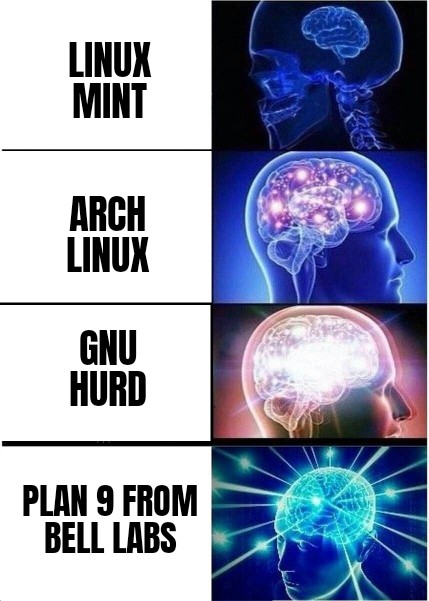Thinking about it, it's weird that there hasn't been any real change in operating systems for about 50 years. Unix and its derivatives seem to be almost the only game in town, apart from desktops running Windows.
linuxmemes
Hint: :q!
Sister communities:
- LemmyMemes: Memes
- LemmyShitpost: Anything and everything goes.
- RISA: Star Trek memes and shitposts
Community rules (click to expand)
1. Follow the site-wide rules
- Instance-wide TOS: https://legal.lemmy.world/tos/
- Lemmy code of conduct: https://join-lemmy.org/docs/code_of_conduct.html
2. Be civil
- Understand the difference between a joke and an insult.
- Do not harrass or attack members of the community for any reason.
- Leave remarks of "peasantry" to the PCMR community. If you dislike an OS/service/application, attack the thing you dislike, not the individuals who use it. Some people may not have a choice.
- Bigotry will not be tolerated.
- These rules are somewhat loosened when the subject is a public figure. Still, do not attack their person or incite harrassment.
3. Post Linux-related content
- Including Unix and BSD.
- Non-Linux content is acceptable as long as it makes a reference to Linux. For example, the poorly made mockery of
sudoin Windows. - No porn. Even if you watch it on a Linux machine.
4. No recent reposts
- Everybody uses Arch btw, can't quit Vim, and wants to interject for a moment. You can stop now.
Please report posts and comments that break these rules!
It's because you don't want to reinvent the wheel all the time. It sucks doing it. Lots of effort. It's much better to build on existing stuff and maybe improve it for your needs.
But that's the thing: is there only one wheel? Maybe wheels are a bad metaphor here, but isn't it weird, that there aren't any fundamentally new concepts? Unix was developed basically during the preschool years of computing and we all just kind of stuck with its concepts.
If the underlying concept is good and was well thought out, it's better to build upon it instead of reinventing it.
Look at the 4 stroke engine (and engines in general) many of the design concepts date back to the 1880s!
There's other engine designs (ex:rotary engine) but the 4 stroke has over a century of testing, improvements, and refinements. A new design can adapt some of the refinements, but would have to catch up on decades of innovation and testing just to catch up!
On the Unix side, there's the evolution of the Posix standard (which was based on Unix).
I would point out, by comparison, that piston engines are effectively obsolete for certain applications. Most aircraft operate on some type of jet engine, which involves the same core concepts of thermodynamics and aeronautics, but are still fundamentally different. They also optimize for different criteria, which is why neither jet engines nor piston engines hold a monopoly on any class of vehicle.
This is really stretching the computer metaphor. I think my point is that there will be room for rethinking paradigms as our applications of computers grow to include things that weren't originally planned for. But in a mature technology there's a lot of established precedent, and that's not easily overcome. It takes something that can improve the field like jet engines made new aircraft possible.
Depends on the level of abstraction you're looking at. Operating systems today are vastly more capable of organizing different provesses, distributing work amongst multiple CPU cores, CPU caches, etc. I guess the von Neumann architecture has just proven really successful in practice. And von Neumann machines require a certain set of capabilities in their OSes.
Maybe look at embedded systems, where we find a bit more variety. Things like DSPs or microcontrollers.
I have thought the same in my adventures into alternative operating systems.
TempleOS🕌
I think the last one to make any real headway was BeOS and they've been dying a thousand deaths ever since Apple bought NeXT instead of them. Though admittedly that perspective is coming from a person who used BeOS once in the 90s and has never touched Haiku.
Plan 9 became Inferno and was quite successful as a distributed OS for network appliances.
What about Fuchsia?
Is that really different? I thought, it's just a "regular" OS.
I installed plan 9 successfully about 15 years ago. And then I did not know what to do.
There was at one time a group pushing to make a more active up to date. User friendly plan 9. Distro if I remember correctly called Harvey OS. They may still be at it. But such a small group means that it's going to take a long time combined with a lot of effort. And at this point so many things have moved on and become rather linux specific even. That the task only keeps getting more and more difficult.
Honestly, in the interim, many of plan 9's better features were adopted in some small part or completely by other operating systems. Definitely not quite as elegantly.
What I really want to know is why is nobody here talking about inferno. It's what came after plan 9.
Sounds like my experience with QNX 6. It was fun for a while, especially with the microkernel novelty. I could kill the mouse driver and bring it back to life. It was interesting to have that on a 486 with memory corruption issues.
RedoxOS >>> It's written in Rust and is learning both from the success of Linux by being source compatible with it and from smaller/experimental OS like Plan9, seL4, Minix and BSD.
Why arch tho
Is it a “beginner to proficient” list, or “sane to 1ns4n3”?
I literally learned about this yesterday after I saw it in my WSL process list.
Linux is a gateway drug to operating systems considered most unnatural.
Stock debian >>>
My beard isn't thick enough for Plan 9 😔
